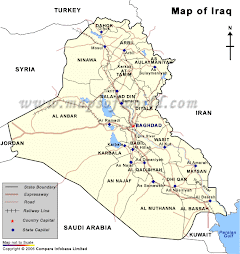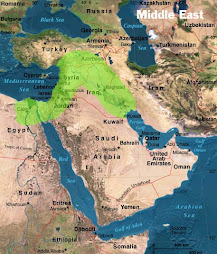
HUMAN RIGHTS WATCH
Missed Opportunities and Bigger Challenges in Middle East in 2009
(Beirut)-Middle East governments repressed efforts to promote human rights and backed away from bold reforms despite growing human rights challenges and promises to take action, Human Rights Watch said today in releasing the Jordan, Lebanon, Saudi Arabia, Syria, and Yemen country studies from its World Report 2010.
The 612-page report, the organization's 20th annual review of human rights practices around the globe, summarizes major human rights issues in more than 90 nations and territories worldwide, including 15 countries in the Middle East and North Africa.
"The year 2009 was one of the missed opportunities for women and migrants in the region," said Sarah Leah Whitson, Middle East director at Human Rights Watch."For human rights defenders, their small space for maneuvering shrank even further."
The studies detail missed opportunities on women's rights in Jordan, Lebanon, Saudi Arabia, and Syria; ineffective measures to protect migrant domestic workers in Jordan, Lebanon, and Saudi Arabia; torture of suspects in custody in Lebanon, Saudi Arabia, and Syria; and repression of human rights defenders in Saudi Arabia, Syria, and Yemen.
Saudi Arabia discriminated against its Shi'a population and Syria against its Kurds; Lebanon disregarded the plight of its Palestinian refugees; and Jordan stripped some Jordanians of Palestinian origin of their Jordanian nationality. Yemen's government committed violations in the civil war in the north and the social unrest in the south.
"Middle East governments should publicly set out their human rights agenda for 2010," Whitson said, "and expect to be measured against their achievements."
Middle Eastern governments responded weakly to calls to curb violence against women. Perpetrators of so-called honor killings in Jordan (where there were at least 20 such killings), and in Syria (at least 12), benefit from legal provisions that mitigate their punishments, even though Syria closed a legal loophole that allowed such perpetrators to avoid criminal sanction altogether. Domestic abuse went largely unpunished in Saudi Arabia and Yemen. In Lebanon and Jordan, where domestic abuse can be tried as assault, protection mechanisms for women are largely inadequate and ineffective.
Despite their increasing participation in public life, women faced discrimination in personal status, nationality, and penal laws. In Lebanon, Syria, Jordan, and Saudi Arabia, women cannot confer their nationality either on foreign spouses or their children. Saudi women require a male guardian's approval for travel, study or work, and to receive health care in certain circumstances. Saudi Arabia promised to abolish the male legal guardianship system over women, but failed to take steps to do so.
Migrant domestic workers in the Middle East faced exploitation and abuse by employers, including excessive work hours, non-payment of wages, and restrictions on their liberty. Governments adopted some measures to reduce the abuse but did not enforce them. Jordan issued regulations providing certain rights to migrant domestic workers after becoming the first Middle Eastern country in 2008 to include them under the labor law. However, these regulations fell short of international standards, and allow for an employer to confine a worker in the employer's house.
In January in Lebanon, the Labor Ministry put in effect tighter regulations for employment agencies and a standard employment contract that clarifies certain terms and conditions of employment for domestic workers, such as the maximum number of daily working hours. However, the rules have no enforcement mechanisms. Suicides and botched escape attempts killed many migrant domestic workers in Lebanon, with eight deaths in October alone.
In Saudi Arabia, Syria, and Yemen, human rights defenders paid a heavy price for their activities. Syrian State Security detained Muhannad al-Hasani, president of the Syrian Human Rights Organization in July, and Haytham al-Maleh, a prominent human rights lawyer, 78, in October, and later charged them with "weakening national sentiment." They remain detained. In Saudi Arabia, the secret police (mabahith) arrested Muhammad al-‘Utaibi and Khalid al-‘Umair in January for attempting to hold a peaceful protest in solidarity with the people of Gaza. One year later, the mabahith still hold them despite the six-month legal limit on pre-trial detention and the prosecution's decision not to press charges.
In Yemen, Central Security, National Security, and Political Security officers arrested scores of activists, mostly from the secessionist so-called Southern Movement, and began trials of some of them for "contesting the unity of the state," including Professor Husain al-‘Aqil, an online journalist, Salah al-Saqladi, and a former diplomat, Muhammad ‘Askar Jubran.
Syria has not licensed any human rights groups, and Saudi Arabia refused legal recognition to at least two new rights groups. Jordan passed a new law extending the government's ability to control and interfere in the work of charitable organizations.
Lebanon, Saudi Arabia, Syria, and Yemen failed to tackle frequent incidents of torture. Jordan's prison reform program has not strengthened accountability mechanisms for torture. Conditions in prisons and detention facilities were poor in Lebanon, with overcrowding and lack of proper medical care a perennial problem. While Lebanon ratified the Optional Protocol to the Convention against Torture (OPCAT) in December 2008, the country has not yet fulfilled its obligation to set up a national preventive mechanism to visit and monitor places of detention.
Saudi authorities punished those they believed responsible for leaking footage of torture in Ha'ir prison, but did not announce steps taken to hold accountable the prison guards who beat the inmates. In Yemen, there were increased reports by detainees of torture in central prisons around the country and in the detention facility of the National Security and the Political Security Organizations in San'a.
The estimated 300,000 Palestinian refugees in Lebanon lived in appalling social and economic conditions and were subject to wide-ranging restrictions on housing and employment. Jordanian authorities since 2004 have arbitrarily deprived over 2,700 Jordanians of Palestinian origin of their nationality, usually on grounds that they did not hold valid Israeli-issued residency permits for the West Bank. No such condition for maintaining Jordanian nationality exists in law. Hundreds of thousands more Jordanians may be at risk of losing their nationality.
Following clashes in Saudi Arabia between minority Shi'a pilgrims and Wahhabi religious policemen in Medina in February, the authorities arrested scores of Shi'a in Medina and in the Eastern Province. The Eastern Province governorate also arrested Shi'a who led prayers in their private homes in Khobar and in Ahsa' and closed Khobar's only mosque for Isma'ilis, a branch of Shi'ism.
Kurds, Syria's largest non-Arab ethnic minority, were subject to systematic discrimination, including the arbitrary denial of citizenship to an estimated 300,000 born in Syria. Authorities suppressed expressions of Kurdish identity and prohibited teaching Kurdish in schools. On February 28, security forces violently dispersed Kurds who had gathered to protest a decree restricting real estate transactions in border areas, and the authorities subsequently detained 21
demonstrators. The authorities also detained and tried at least nine prominent Kurdish political leaders on vague charges of "weakening national sentiment" and "broadcasting false information."
"Middle Eastern governments need to recognize that the rights of minorities, refugees, and stateless persons need greater protections," Whitson said.
In 2010, Jordan should:
- Strike clauses from the law that allow for punishment-reducing mitigating circumstances for "honor" killers.
- Ease restrictions in the law governing the operation of nongovernmental organizations to bring it into compliance with international standards on freedom of association.
- Revise regulations governing migrant domestic workers to comply with international labor and human rights standards, and set up a mechanism to investigate allegations of abuses against workers.
- Strengthen accountability for torture by moving jurisdiction over acts of torture by police agents from the Police Court to the civilian courts.
- Stop withdrawing the nationality of Jordanian citizens of Palestinian origin.
In 2010, Lebanon should:
- Amend its citizenship law to ensure that all Lebanese women, regardless of the nationality of their husbands, can pass on their citizenship to their children and husbands.
- Publish the results of the Interior Ministry's 2008 investigations into torture, set up a national prevention mechanism for torture, and prosecute officials suspected of torture.
- Amend the labor code to provide legal protection for domestic workers equal to that for other workers and create a labor inspection unit to monitor working conditions for migrant domestic workers.
- Amend legislation that restricts the ability of Palestinian refugees to own property and remove restrictions on their employment.
In 2010, Saudi Arabia should:
- Dismantle the system of male legal guardianship over women, and strengthen protection for women against violence and accountability for perpetrators of such violence.
- Ensure equal citizenship rights for its Shi'a minorities, especially the freedom to practice their religion.
- Release long-term detainees or try them in fair proceedings that meet international standards.
In 2010, Syria should
- Free people being detained for peacefully exercising freedom of expression, association, or assembly.
- Form a commission to address the human rights grievances of the Kurdish minority.
- Investigate officials alleged to have tortured or mistreated detainees.
- Reform all the articles in the criminal code that treat those who say they killed for "honor" more leniently than other murderers.
In 2010, Yemen should
- End child marriage and strengthen protection for victims of violence against women and accountability for perpetrators of such violence.
- Take steps to combat torture, including facilitating visits by independent monitors to all places of detention and prosecuting officials alleged to have participated in torture.
- Stop indiscriminate bombardments of civilians in the armed conflict with northern rebels, and create a mechanism to ensure that the armed forces, or allied tribal militias, do not employ child soldiers.
- Train law enforcement officers on non-lethal methods of crowd control, and do not use deadly force against unarmed protesters, such as those who participated in large demonstrations in the southern provinces.
- Respect the rights to freedom of expression and of assembly and release all persons detained for their peaceful expression or participation in peaceful protests.





